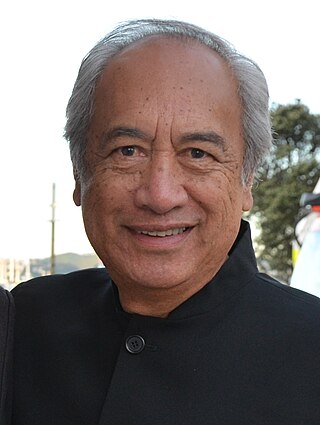Wero may refer to:
- Wero (payment), a European payment system
- Wero (Māori), a traditional Māori challenge
- Wero Tāroi (c.1810–1880), a New Zealand Māori carver
- WERO, a radio station in North Carolina, US
Wero may refer to:

Witi Tame Ihimaera-Smiler is a New Zealand author. Raised in the small town of Waituhi, he decided to become a writer as a teenager after being convinced that Māori people were ignored or mischaracterised in literature. He was the first Māori writer to publish a collection of short stories, with Pounamu, Pounamu (1972), and the first to publish a novel, with Tangi (1973). After his early works, he took a ten-year break from writing, during which he focused on editing an anthology of Māori writing in English.

A taiaha is a traditional weapon of the Māori of New Zealand; a close-quarters staff weapon made from either wood or whalebone, and used for short, sharp strikes or stabbing thrusts with efficient footwork on the part of the wielder.
Taki may refer to:

Ian Gordon Ferguson is New Zealand's second most successful Olympian. He won four Olympic gold medals competing in K1, K2, and K4 kayak events, and attended five Summer Olympics between 1976 and 1992. He also won two canoe sprint world championship titles.

A pōwhiri is a Māori welcoming ceremony involving speeches, cultural performance, singing and finally the hongi. It is used to both welcome guests onto a marae or during other ceremonies, such as during a dedication of a building or at the beginning of the school year. A pōwhiri may not be performed for every group of manuhiri (visitors); a mihi whakatau may be used instead. A pōwhiri is often used for special visitors or for tūpāpaku for a tangihanga (funeral). However, a pōwhiri are also often performed for tourist groups as part of special events.

WERO is a contemporary hit radio music formatted radio station for Eastern North Carolina licensed to Washington, North Carolina, US, targeting the Greenville, North Carolina, and Eastern North Carolina areas.
Western Springs College is a state co-educational secondary school located in Western Springs, an inner suburb of Auckland, New Zealand. Western Springs College and Ngā Puna o Waiōrea teach collaboratively on one campus. The school educates approximately 1848 students, from Years 9 to 13. The school was originally part of Seddon Memorial Technical College, but was moved to the current Western Springs site in 1964.
Māori or Maori can refer to:

iDEAL is an e-commerce payment system used for online banking in the Netherlands. Previously controlled by the Dutch e-commerce organization Currence since 2006, the company became owned by the European Payments Initiative (EPI) from October 2023.

Toi whakairo or just whakairo (carving) is a Māori traditional art of carving in wood, stone or bone.

Giropay is an Internet payment system in Germany, based on online banking. Introduced in February 2006, this payment method allows customers to buy securely on the Internet using direct online transfers from their bank account. The system is similar to the Dutch iDEAL payment system, MyBank payment system, the Interac online service in Canada, pagomiscuentas payment service in Argentina, and Secure Vault Payments in the United States. Giropay was owned by giropay GmbH until December 2020, when it was acquired by paydirekt. The two began a merger in May 2021. On 1 July 2024 paydirekt announced that the Giropay service will be shut down on 31 December 2024. Some payment providers stopped the service on 30 June 2024. It will be replaced by the European payment system Wero, which was launched on 2 July 2024.
Wero Tāroi (c.1810–1880), also known as Wero Mahikore and Karu, was a notable New Zealand Māori carver of the Ngāti Tarāwhai iwi. He was born at Lake Ōkataina, in the Rotorua district in New Zealand, and active from about 1860. Wero's works include Te Puawai o Te Arawa, and storehouses such as Tiki-o-Tamamutu at Taupō, Te Puawai-o-Te-Arawa at Maketū, and Tokopikowhakahau at Tāpapa.

Tene Waitere was a New Zealand Māori carver from the Rotorua district. He identified with the Ngāti Tarāwhai and Te Arawa iwi. His mother was Ani Pape, the daughter of Te Rāhui, a Ngāti Tarāwhai leader. As a young girl, she was captured by Ngāpuhi during an attack on Rotorua in 1823 and taken as a slave to Northland, where she was forced to marry a Waitere. Tene Waitere was born probably in 1853 or 1854 at Mangamuka. When Tene was a few years old an uncle brought him, his elder sister Mereana Waitere and their mother to Ruatō, on Lake Rotoiti. There he was trained as a carver by Wero Tāroi and Ānaha Te Rāhui. He married Ruihi Te Ngahue of Tūhourangi and they had one child, a daughter Tuhipō. One of Tuhipō's children was Rangitiaria Dennan, better known as Guide Rangi. Eramiha Neke Kapua, another carver, was Waitere's nephew, son of his sister Mereana. Some of Waitere's carvings included Tiki-a-Tamamutu, Hinemihi, the Kearoa whakawae and Rauru, and in the 1900s worked on the Whakarewarewa model village near Rotorua.

Robyn Kahukiwa is an Australian-born New Zealand artist, award-winning children's book author, and illustrator. Kahukiwa has created a significant collection of paintings, books, prints, drawings, and sculptures.

Wero, also known as taki, is a traditional Māori challenge, performed as part of the Māori protocol. Its purpose is to ensure that visitors come in peace. It also establishes their steadfastness, and the prowess of the challenging warriors.
Ngāti Tarāwhai is a Māori iwi of the Rotorua area of New Zealand, and a member of the Te Arawa confederation of tribes. The iwi's rohe covers the western shore of Lake Ōkataina.

The European Payments Initiative (EPI), previously known as the Pan-European Payments System Initiative (PEPSI), is a unified digital payment service backed by 16 European banks and payment service providers. Its aim is to allow European consumers and merchants to make next-generation payments for all types of person-to-person transfers and retail transactions via a digital wallet, called Wero. Wero is based on instant account-to-account payments and will eliminate intermediaries in the payment chain and associated costs.

Budget 2022, dubbed the Wellbeing Budget 2022, is the New Zealand budget for fiscal year 2022/23, presented to the House of Representatives by Finance Minister, Grant Robertson, on 19 May 2022 as the fifth budget presented by the Sixth Labour Government. This budget was released in the midst of socio-economic impacts of the widespread community transmission of the SARS-CoV-2 Omicron variant, rising living costs, and the 2022 Russian invasion of Ukraine.
In Māori, a mihi or mihi whakatau is a formal or semi-formal speech or speeches of greeting at a meeting such as a hui. The speech acknowledges those present, and may be accompanied by other ritual greetings or acknowledgements, such as pōwhiri, wero, or recital of pepeha. The term mihimihi is often used when speeches and introductions are exchanged.
Wero is an European mobile payment system intended to replace Giropay in Germany, Paylib in France and to complement Payconiq in Belgium. The service was launched on 2 July 2024 by the European Payments Initiative. The service has the goal to being a competitor for PayPal and similar services, but from the beginning as a real-time payment system and later with extended online payment function.